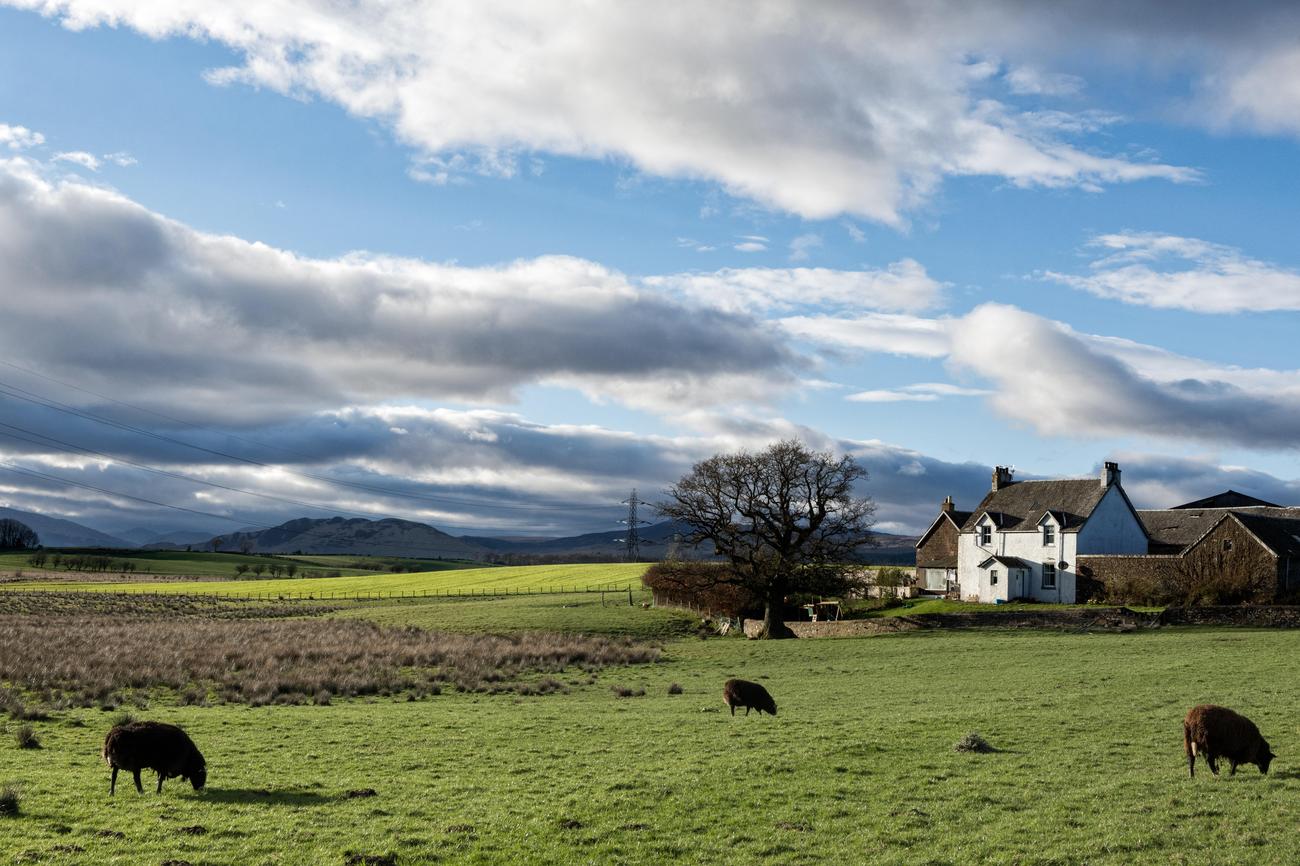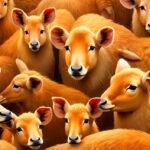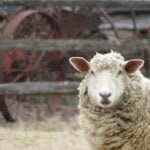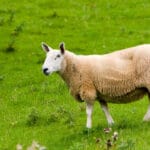Sheep Diet Essentials: Exploring What Sheep Eat for Optimal Nutrition

Welcome to a comprehensive exploration of sheep diet essentials – a topic of utmost importance for any livestock enthusiast or animal nutritionist. In this article, we dive deep into the fascinating world of what sheep eat, uncovering the key components that contribute to their optimal nutrition. As an experienced animal nutritionist with a passion for livestock welfare, I am thrilled to share my insights into the dietary requirements of sheep, shedding light on their preferred feed sources and offering practical advice on how to ensure their wellbeing through proper nutrition. So, let’s embark on this enlightening journey and discover the secrets behind a sheep’s nourishing diet!
Introduction
What Do Sheep Eat?
Sheep are fascinating creatures with unique dietary requirements. As an animal nutritionist specializing in sheep, I have spent years studying their digestive systems and feeding behaviors. In this article, we will delve into the essentials of a sheep’s diet, exploring what they eat for optimal nutrition. So, let’s dive right in and discover the key components of a sheep’s menu!
Forbs: A Favorite Choice
When it comes to food preferences, sheep have a clear favorite – forbs. Forbs are broad-leaf flowering plants other than grass. These include plants like clover, alfalfa, dandelions, and chicory. Sheep are natural foragers, and forbs serve as a vital part of their diet. They are not only nutrient-rich but also provide variety and flavors that sheep enjoy. So, next time you see a sheep grazing happily in a field, remember that it’s likely indulging in some delicious forbs!
“Forbs are like a buffet of flavors for sheep, offering a diverse and appetizing range of nutrients.”
Pasture Grasses: A Staple for Sheep
While forbs may be their first choice, sheep are well-adapted to survive solely on pasture grass. These resilient herbivores have a complex digestive system that enables them to efficiently extract nutrients from grass. Among the preferred pasture grasses for sheep are ryegrass and timothy. These grasses not only provide sustenance but also contribute to the overall health of the animals.
“Pasture grasses are like a nutritious salad for sheep, supplying them with the essential vitamins and minerals they need.”
Supplementary Options for Optimal Nutrition
To ensure that sheep receive a well-rounded diet and meet their energy needs, supplements play a crucial role. One common supplement is hay, which serves as a valuable food source, especially during winter when fresh pasture grass is scarce. Hay provides sheep with a much-needed source of fiber and helps keep their digestion in optimal condition.
Additionally, grains can be incorporated into a sheep’s diet as a supplemental feed. These include oats, barley, and corn. However, it’s important to note that grains should be introduced gradually and in moderation, as an excessive amount can upset the delicate balance of a sheep’s digestive system.
“Supplements like hay and grains complement the sheep’s diet, ensuring they receive all the necessary nutrients for their well-being.”
Feeding Considerations for Different Life Stages
Just like humans, sheep have different dietary needs at various stages of their lives. Lambs, or baby sheep, require a diet rich in milk from their mothers or milk replacers. As they grow, their diet gradually transitions to include more solid foods like pasture grass and forbs.
Adult sheep, on the other hand, have higher energy requirements due to their size and reproductive activities. They need a substantial amount of food to maintain their overall health and productivity. Providing a balanced diet, including a mix of forbs, pasture grasses, and supplements, is essential for their well-being.
“Tailoring the diet to each life stage ensures that sheep receive the right nutrition at the right time, setting them up for a healthy and thriving life.”
Common Sheep Breeds and Their Dietary Needs
Sheep come in various breeds, each with its own unique characteristics and dietary preferences. Some common breeds include Dorper and Romy Shale. Understanding the specific needs of each breed allows us to optimize their nutrition and ensure their overall health and vitality.
“Different sheep breeds have distinct dietary demands, and by catering to their preferences, we can unlock their full potential.”
Conclusion
Sheep are fascinating creatures with a diverse palate. While forbs are their top choice, they can thrive on a diet of pasture grass alone. However, to ensure optimal nutrition and overall well-being, it is crucial to provide a balanced diet that meets their dietary requirements. By considering the nutritional needs, digestive capabilities, and foraging behavior of sheep, we can unlock the key to their health and happiness.
So, the next time you encounter a flock of sheep grazing contently, you’ll have a deeper understanding of what they eat and how their diet affects their well-being. Remember, by nourishing their bodies with the right food, we contribute to the overall welfare of these remarkable animals.
Happy feeding!
Sheep are fascinating creatures with a rich history and many interesting facts. If you’re curious to learn more about these woolly animals, we have compiled a list of facts about sheep that will amaze and delight you. From their extraordinary ability to recognize and remember faces, to the surprising diversity of their wool textures and colors, sheep are truly unique. So why wait? Click here to discover more about the fascinating world of sheep!
facts about sheep
What Sheep Should Eat: A Guide to a Healthy Diet
[youtube v=”8Hzo-MSuLnI”]
Sheep’s Favorite Foods: Forbs and Pasture Grasses
Sheep, as ruminants, have unique dietary needs that differ from other farm animals such as pigs or chickens. Their diet consists of forbs, which are plants like clover, alfalfa, dandelions, and chicory. These forbs, including perennial native grasses like ryegrass and timothy, are a staple in a sheep’s diet. Grazing on these plants not only provides them with essential nutrients but also contributes to their overall health. As the transcript mentions, “Sheep love grass and clover… that’s about their diet.”
Essential Supplements: Hay and Grains
While forbs and pasture grasses are crucial for a well-rounded diet, sheep also benefit from certain supplements. Hay, which can be made from a variety of grasses, is an excellent source of fiber and can supplement their grazing diet. Additionally, grains like oats, barley, and corn provide energy and a balanced diet for sheep. However, it’s important to note that grains, especially corn, should not be the primary focus of a sheep’s diet. The transcript advises against feeding sheep corn as it is too hot of a grain for them. Instead, grains should be given in moderation and used for specific purposes, like facilitating sheep movement or training.
Meeting Dietary Needs at Different Life Stages
Sheep have different dietary needs at different stages of their lives. Lambs, for example, require milk as their primary source of nutrition before slowly transitioning to solid foods. This gradual change in their diet ensures that their nutritional needs are met as they grow. It is essential to provide lambs with a balanced diet that includes milk and, later on, a gradual introduction to forage and grains. As the transcript emphasizes, “The point is that they should not be getting a full-on grain diet.”
Catering to Different Sheep Breeds
Different sheep breeds may have specific dietary preferences, and understanding these preferences can optimize their nutrition and overall health. Hair sheep, such as Dorpers, Katahdins, or St. Croix, tend to prefer more roughage and can thrive on a diet that includes a higher proportion of forage. On the other hand, wool sheep, like a typical white-faced breed, may lean more towards a diet similar to that of a cow, with a larger proportion of grass. Understanding the unique dietary needs of different sheep breeds is crucial in providing them with a well-balanced diet.
Importance of a Balanced Diet for Health and Happiness
Providing a balanced diet that considers the nutritional needs and foraging behavior of sheep is key to their health and happiness. A diet focused on forbs and pasture grasses ensures that sheep receive essential nutrients, maintain a healthy weight, and contribute to soil health through their grazing habits. Conversely, an excessive amount of grain can lead to various health issues and shorter shelf life of the meat. Avoiding grain as the primary food source for sheep not only promotes their well-being but also proves to be economical. Grazing on grass is cost-effective and beneficial for the environment.
In conclusion, understanding what sheep should eat is crucial for their overall health and productivity. A diet primarily consisting of forbs and pasture grasses provides sheep with the necessary nutrients, promotes their well-being, and contributes to soil health. While supplements like hay and grains can be beneficial, it is important to avoid an excessive grain diet and focus on providing a well-balanced diet that caters to the unique needs of different sheep breeds. By following these guidelines, you can ensure that your sheep are healthy, happy, and thriving. As the transcript highlights, “Grass is cheaper, easier, and healthier for all parties involved.”

FAQ
Q: What do sheep eat for optimal nutrition?
A: Sheep primarily eat grass, legumes, forbs, and other pasture plants. Forbs, which are broad-leaf flowering plants, are their top choice of food. Sheep can also survive solely on pasture grass, especially ryegrass and timothy, as they are herbivores. To ensure optimal nutrition, it is important to provide them with a balanced diet that meets their nutritional needs.
Q: Can sheep eat dog food?
A: No, sheep should not eat dog food. Dog food contains animal ingredients that sheep cannot properly digest. It is important to stick to their natural diet of grass, legumes, forbs, and other pasture plants for their overall health and well-being.
Q: What is the digestive process of sheep?
A: Sheep have a complex digestive system. They break down food through chewing, regurgitating, and further digestion. Their multi-chambered stomachs allow them to efficiently process and extract nutrients from their food.
Q: What do lambs, baby sheep, prefer to eat?
A: Lambs, or baby sheep, have different dietary preferences compared to adult sheep. They may prefer milk from their mothers or a milk replacer formula specially designed for them. As they grow, their diet gradually transitions to include pasture grass, legumes, and other food sources.
Q: What should sheep be fed in winter?
A: In winter, when pasture grass is scarce, sheep rely on hays as a primary source of food. Providing them with quality hay ensures they receive the necessary nutrients to maintain their health and energy levels during the colder months.
“`json
“`
- Unlock Water’s Symbolism: A Cross-Cultural Exploration - April 20, 2025
- Identify Black and White Snakes: Venomous or Harmless? - April 20, 2025
- Unlocking Potential: Origins High School’s NYC Story - April 20, 2025















